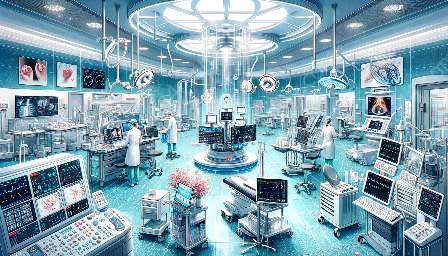Biotechnology and medical devices are two critical fields that have significantly contributed to the advancement of healthcare. The convergence of these disciplines has given rise to groundbreaking innovations in the form of biotechnology-integrated medical devices, revolutionizing diagnosis, treatment, and patient care. This article delves into the exciting prospects and impacts of interdisciplinary collaborations on the future of biotechnology-integrated medical devices.
The Intersection of Biotechnology and Medical Devices
Biotechnology encompasses the use of living organisms, biological systems, or derivatives to develop products and processes that improve human life. Medical devices, on the other hand, refer to a broad range of instruments, apparatuses, and machines used in the diagnosis, treatment, and management of medical conditions. The integration of biotechnology and medical devices has opened up new avenues for creating advanced and personalized healthcare solutions.
Interdisciplinary Collaborations Fueling Innovation
The synergy between experts in biotechnology and medical device engineering has led to remarkable advancements. Through collaborative efforts, researchers and professionals are combining biological knowledge with cutting-edge technology to develop smart medical devices that can monitor, diagnose, and treat diseases with precision. This collaborative approach has also paved the way for the integration of biocompatible materials, biosensors, and innovative drug delivery systems into medical devices, enhancing their efficacy.
Enhancing Diagnostics and Treatment
One of the most significant impacts of interdisciplinary collaborations in biotechnology-integrated medical devices is the enhancement of diagnostic capabilities. Biotechnology plays a crucial role in the development of diagnostic tools that leverage genetic and molecular insights to detect diseases at early stages, enabling prompt intervention and personalized treatment plans. Medical devices integrated with biotechnology have also improved the delivery and effectiveness of therapeutics, leading to better patient outcomes.
Empowering Patient-Centric Care
The evolution of biotechnology-integrated medical devices has empowered patients by offering non-invasive monitoring, continuous data analysis, and personalized treatment options. Wearable biotechnological devices, for instance, enable individuals to actively participate in their healthcare management, leading to better adherence to treatment regimens and improved overall well-being. Additionally, the integration of biotechnology in medical devices has facilitated the development of smart prosthetics and implants that mimic natural physiological mechanisms, significantly enhancing the quality of life for patients.
Addressing Challenges and Ethical Considerations
As interdisciplinary collaborations continue to shape the future of biotechnology-integrated medical devices, it is essential to address associated challenges and ethical considerations. Ensuring data security and privacy, navigating regulatory frameworks, and promoting equitable access to advanced medical technologies are crucial considerations in the development and deployment of these innovative devices. Moreover, ethical guidelines and transparent communication surrounding the integration of biotechnology in medical devices are vital to uphold patient safety and well-being.
Future Perspectives and Opportunities
The future of biotechnology-integrated medical devices holds immense promise. As interdisciplinary collaborations thrive, there are exciting opportunities to further miniaturize and improve the performance of medical devices, making them more accessible and cost-effective. Moreover, the convergence of biotechnology, artificial intelligence, and robotics presents new frontiers in developing autonomous diagnostic and therapeutic systems, accelerating the shift towards precision medicine and personalized healthcare.
Conclusion
Interdisciplinary collaborations between the realms of biotechnology and medical devices are redefining the landscape of healthcare. With innovative solutions emerging from these partnerships, the future of biotechnology-integrated medical devices promises to revolutionize medical diagnostics, treatments, and patient care, ultimately shaping a healthier and more connected world.


